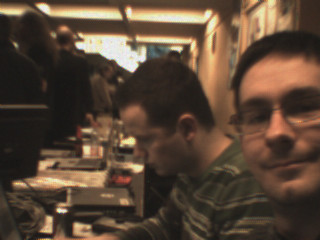This is the first Haiku alpha 1 status update. The goal of this status update is to
provide information on how the project is going. There has recently been an consensus
that it was about time to start preparing a first alpha for a myriad of reasons.
To me personally, the fact that it is about time to show off the enormous amount
of work that has been put in the project the past number of years. Another good
reason - in my opinion - is to get everyone behind one goal: preparing the code
for a first release.
So what's the goal of this status update? Well, with a large number
of developers actually working on the different components of the operating
system, it is easy to lose track of what is going on. You can consider this
a news update.
I’ve gotten several (at least five or six) emails from people contacting me through this website. It seems to be a common question.
I’d like to publicly apologize to any that I have not responded to personally. To those of you, I’m sorry.
So here, publicly posted, is how to get started in helping out with the OpenJDK port.
Read http://openjdk.java.net/contribute/ You'll need to sign an SCA and do what it says regarding the licensing.
Document Obsolete
2009-June: This document is now obsolete. We are in the process of consolidating and re-organizing the website documentation. For now please refer to one of these guides. Alternatively, you can view the in-progress website documentation.
As everyone knows (or should), every BeOS install CD was actually a live CD (way before Linux “invented” it…). And of course so would be for Haiku.
While it used to work long ago, nobody actually tried to make one for some time, and some fixes were required to make it happen again.
Making an usable CD still requires some work (Bootscript.cd, ramdisk for settings maybe…), but it finally boots again.
The "Chemnitzer Linux Tage" (Chemnitzer Linux Days) was actually celebrating it's tenth anniversary. It started out as a kind of Linux install fest, but has since become a general Open Source event where all kinds of projects have a platform to demonstrate themselves. So despite the name, this event was perfect for Haiku.
After procrastinating for far too long on getting a project proposal in to the OpenJDK Community Innovators' Challenge, I finally drafted and submitted a proposal to port HotSpot to Haiku, x86 just a few hours before the deadline.
Should the project be selected, Andrew and I will likely have ample motivation to accomplish the stated goals of the proposal on time. I firmly believe the goals set forth are reasonable, seeing as Andrew is a machine, and this time around I know a whole lot more about what we’re doing with the VM.
It’s been nearly a month since the creation of the Haiku port in the OpenJDK project.
In that time, not much has happened. Sadly.
Every single weekend thus far, I’ve been committed to doing something other than Haiku – and I don’t like it.
That said there has been some progress made.
OpenJDK is readying support for our Mercurial access. Andrew recovered the data from his failed hard disk. This was his work toward merging some of the previous 1.
A nice overview in mind map format, for those of you interested.
Here’s a summary of the last 3 weeks in Haiku-land. Axel was off skiing for part of this period, but progress has continued apace (and Axel has still managed to make his way into almost all of my update sub-sections!).
Highlights include progress towards self-hosting, a new kernel allocator that is much faster and more scalable, improved VMware Image support in the build system, automatic syscall restarts, and the usual raft of bug fixes, stability updates and interface tweaks.
Here are some screenshots of what I fixed at FOSDEM…
Hi there from our FOSDEM booth in the corridor!






